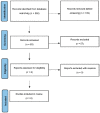Hand Washing: When Ritual Behavior Protects! Obsessive-Compulsive Symptoms in Young People during the COVID-19 Pandemic: A Narrative Review
- PMID: 35683574
- PMCID: PMC9181440
- DOI: 10.3390/jcm11113191
Hand Washing: When Ritual Behavior Protects! Obsessive-Compulsive Symptoms in Young People during the COVID-19 Pandemic: A Narrative Review
Abstract
The Coronavirus Disease 2019 (COVID-19) pandemic had a profound impact on the lifestyles and mental health of young people. It has been hypothesized that the focus on hygiene and the fear of contamination/infection during the pandemic may have exacerbated obsessive-compulsive (OC) symptoms in this population. OC symptoms are widespread in the general population, with varying degrees of intensity. At their most extreme, they manifest in obsessive-compulsive disorder (OCD), which is characterized by obsessive thoughts and compulsive behaviors. The present narrative review aimed at evaluating the relationship between the COVID-19 pandemic and OCD and OC symptoms in young people, especially children and adolescents with and without OCD, focusing on vulnerability and risk factors and the impact of lockdown measures. Of the six studies identified, four examined clinical samples diagnosed with OCD and two looked at community-based adolescent samples. Five of the six studies found that OC symptoms increased during the pandemic. Additionally, vulnerability to anxiety may constitute a risk condition and the lockdown measures and personal stressful life events can constitute potential triggers of OC symptoms, while ongoing treatment for OCD had a protective effect. The results suggest that, during the COVID-19 pandemic, obsessive and compulsive behavior (e.g., hand washing) in young people at the greatest risk should be monitored, and the intervention of mental health services should be maintained. More research is needed in this area.
Keywords: COVID-19; OCD; hand washing; obsessive–compulsive symptoms; pandemic; young people.
Conflict of interest statement
The authors declare no conflict of interest.
References
-
- World Health Organization (WHO) Director-General’s Opening Remarks at the Media Briefing on COVID-19. World Health Organization; Geneva, Switzerland: Mar, 2020.
Publication types
LinkOut - more resources
Full Text Sources


